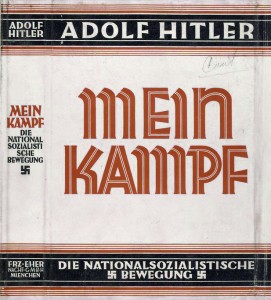Struggling with Mein Kampf

A controversy has arisen surrounding the German republication of Mein Kampf, Adolf Hitler’s infamous memoir/Nazi manifesto. Although copies of this historical literary work (in English My Struggle) aren’t totally impossible to find in Germany and have always been printed and sold around the world, a new edition of the book hasn’t been released in Germany since Hitler’s death when the German copyright was banned by the state of Bavaria (which had taken it over during WWII). However, the copyright on the book will expire at the end of the year and history buffs are eager to have the book released again.
The Institute for Contemporary History’s editors are working to develop a new edition of Mein Kampf that will be more than twice the length of the original and will include annotated criticism and analysis. Lifting the decades-long ban on the book sparks the debate of whether the historical significance of the literature outweighs the negativity and potential harm of its content. The Jewish Community of Berlin and the World Jewish Congress are against its republication in Germany regardless of its historical significance. Stressing their responsibility to victims of Nazi crimes, they insist that “hatred of Jews cannot be sold in Germany.”
Although the nature of Mein Kampf and Hitler’s anti-Semitic ideology is uncomfortable to say the least, the book should not be banned. It’s a piece of history—very important history that characterizes one of the most influential men of all time. It’s important to understand that studying a sensitive topic, especially one so world-changing as Nazism, doesn’t translate into promotion of that idea. In fact, it can provide us with insight to prevent future holocausts.
History is our only precedent to everything that happens to us today, tomorrow, and ever again. History deters us from repeating mistakes and directs us towards fairer solutions and happier endings. It allows us to recognize the warning signs of dangerous situations. In a statement addressing the concerns of many Germans, the Institute for Contemporary History’s deputy director, Magnus Brechtken, said, “I understand some immediately feel uncomfortable when a book that played such a dramatic role is made available again to the public. On the other hand, I think that this is also a useful way of communicating historical education and enlightenment—a publication with the appropriate comments, exactly to prevent these traumatic events from ever happening again.”
There is no doubt that Hitler was one of the most manipulative, putrid, and nihilistic humans in history. The point is, no matter how horrible history can be, it’s what shapes us as individuals and as nations. We must not encourage the denial of history simply to avoid upsetting someone. Rather, we must learn from tragedy. What better way to defeat our enemies than to know them? Peter Ross Range of the New York Times said, “The inoculation of a younger generation against the Nazi bacillus is better served by open confrontation with Hitler’s words than by keeping his reviled tract in the shadows of illegality.” As painful as it may be, it’s more important for young Jewish men and women to understand the threats to their people more than it is to deny it.
Do you think the ban on Mein Kampf should remain in effect in Germany? Tell us in a comment below!
